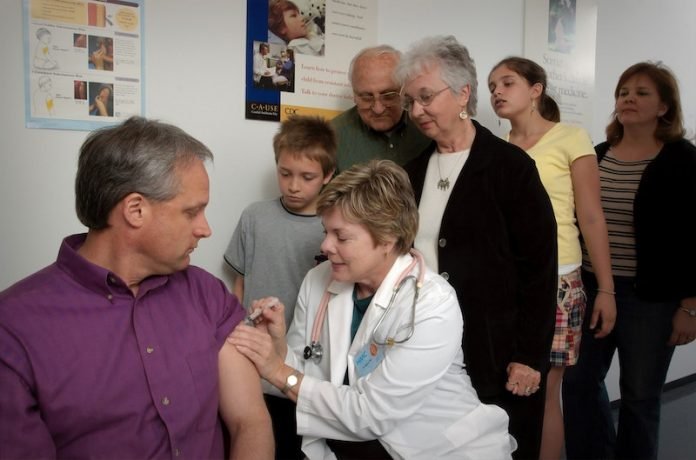
Recent research has shown that live attenuated vaccines provide protection against lethal infections unrelated to the target pathogen of the vaccine.
They induce trained nonspecific immune cells for improved host responses against subsequent infections.
Live attenuated vaccines induce nonspecific effects representing “trained innate immunity” by training immune system cells in the bone marrow to function more effectively against infections.
In a recent study at Louisiana State University and elsewhere, researchers found that the MMR (measles, mumps, rubella) vaccine could serve as a preventive tool to dampen inflammation linked to COVID-19 infection.
Vaccination with MMR in immunocompetent people has no harmful effects and may be especially effective for health care workers who can easily be exposed to COVID-19.
The study is published in mBio. One author is Dr. Paul Fidel, Jr., Department Chair, Oral and Craniofacial Biology.
In the study, the team found vaccination with a live attenuated fungal strain-induced trained innate protection against lethal polymicrobial sepsis.
The protection was mediated by long-lived myeloid-derived suppressor cells (MDSCs) previously reported inhibiting septic inflammation and mortality in several experimental models.
The researchers say that an MMR vaccine should be able to induce MDSCs that can inhibit or reduce the severe lung inflammation/sepsis linked to COVID-19.
Death in COVID-19 cases is strongly linked to progressive lung inflammation and eventual sepsis.
Recent events provide support for the researchers’ hypothesis.
The milder symptoms seen in the 955 sailors on the U.S.S Roosevelt who tested positive for COVID-19 (only one hospitalization) may have been a consequence of the fact that the MMR vaccinations are given to all U.S. Navy recruits.
In addition, epidemiological data suggest a correlation between people in geographical locations who routinely receive the MMR vaccine and reduced COVID-19 death rates.
COVID-19 has not had a big impact on children, and the researchers hypothesize that one reason children are protected against viral infections that induce sepsis is their more recent and more frequent exposures to live attenuated vaccines that can also induce the trained suppressive MDSCs that limit inflammation and sepsis.
The researchers propose a clinical trial to test whether the MMR vaccine can protect against COVID-19, but in the meantime, they suggest that all adults, especially health care workers, and individuals in nursing homes get the MMR vaccine.
Copyright © 2020 Knowridge Science Report. All rights reserved.



